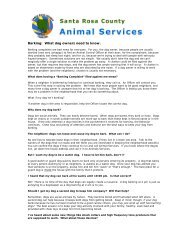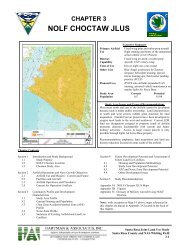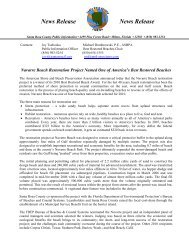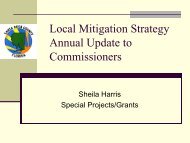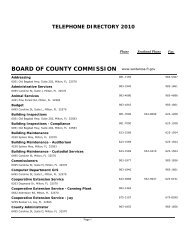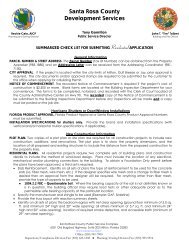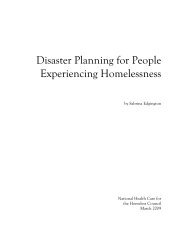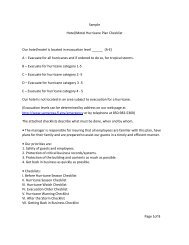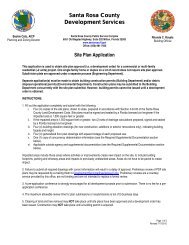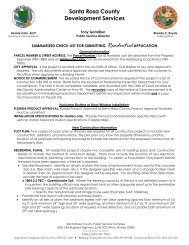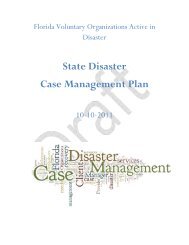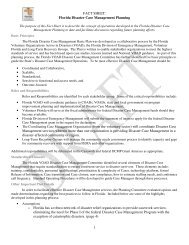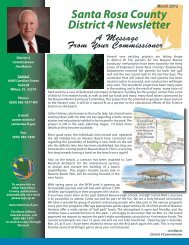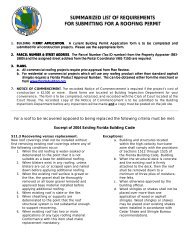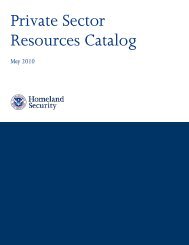Disaster - Santa Rosa County
Disaster - Santa Rosa County
Disaster - Santa Rosa County
Create successful ePaper yourself
Turn your PDF publications into a flip-book with our unique Google optimized e-Paper software.
<strong>Disaster</strong>s & Special Needs<br />
16<br />
In a disaster, people with special medical needs have extra<br />
concerns. Take the following steps if you or your family<br />
members have special medical needs:<br />
• Have an extra three day supply of any medical supplies you<br />
use, such as bandages, ostomy bags or syringes.<br />
• For all medical equipment requiring electrical power such as<br />
beds, breathing equipment, or infusion pumps - check with<br />
your medical supply company and get information regarding<br />
a back-up power source such as a battery or generator.<br />
• If you use oxygen, have an emergency supply (enough for at<br />
least a three day period).<br />
• Oxygen tanks should be securely braced so they do not fall<br />
over. Call your medical supply company regarding bracing<br />
instructions.<br />
• Prepare copies of vital medical papers such as insurance<br />
cards and power of attorney.<br />
• Store extra batteries for hearing aids, implants, TTY and light<br />
phone signaler.<br />
• If hearing impaired, determine how you will communicate<br />
with emergency personnel if there is no interpreter or if you<br />
don’t have your hearing aids. Store paper and pens for this<br />
purpose.<br />
• Service animals may become confused, frightened or<br />
disoriented during and after a disaster. Keep them confined<br />
or securely leashed or harnessed. A leash/harness is an<br />
important item for managing a nervous or upset animal.<br />
Preparing Your Medication<br />
33<br />
Always have at least a three day<br />
supply of all your medications. In some<br />
emergencies, such as an influenza<br />
pandemic, you may need to prepare for<br />
a week or more.<br />
33<br />
Store your medications in one location in<br />
their original containers.<br />
33<br />
Have a list of all of your medications:<br />
name of medication, dose, frequency,<br />
and the name of the prescribing doctor.<br />
Special Needs<br />
Coping with Anxiety<br />
Coping with the uncertainty and stress of disasters can lead to<br />
anxiety. It is normal to be worried during a disaster and people can<br />
experience changes in their physical, emotional or mental state<br />
during and after emergencies. Here are some tips to help ease the<br />
anxiety (Please note that if these reactions seem extreme or last for a<br />
long time, the person suffering from the condition should seek help):<br />
When an emergency happens, it is important to keep<br />
things in perspective. Get reliable information about the<br />
event from:<br />
• Newspaper, radio, television<br />
• Your health care provider or local health department<br />
• Your <strong>Santa</strong> <strong>Rosa</strong> <strong>County</strong> Government<br />
and emergency management division at<br />
www.santarosa.fl.gov.<br />
• Limit your exposure to graphic news stories<br />
• Get accurate, timely information from reliable<br />
sources<br />
• Learn more about the specific hazard<br />
• Maintain your normal routine, if possible<br />
• Avoid drugs and excessive drinking<br />
• Exercise, eat well and get enough sleep<br />
• Stay active physically and mentally<br />
• Stay in touch with family and friends<br />
• If you can, help others<br />
• Keep a sense of humor<br />
• Share your concerns with others



